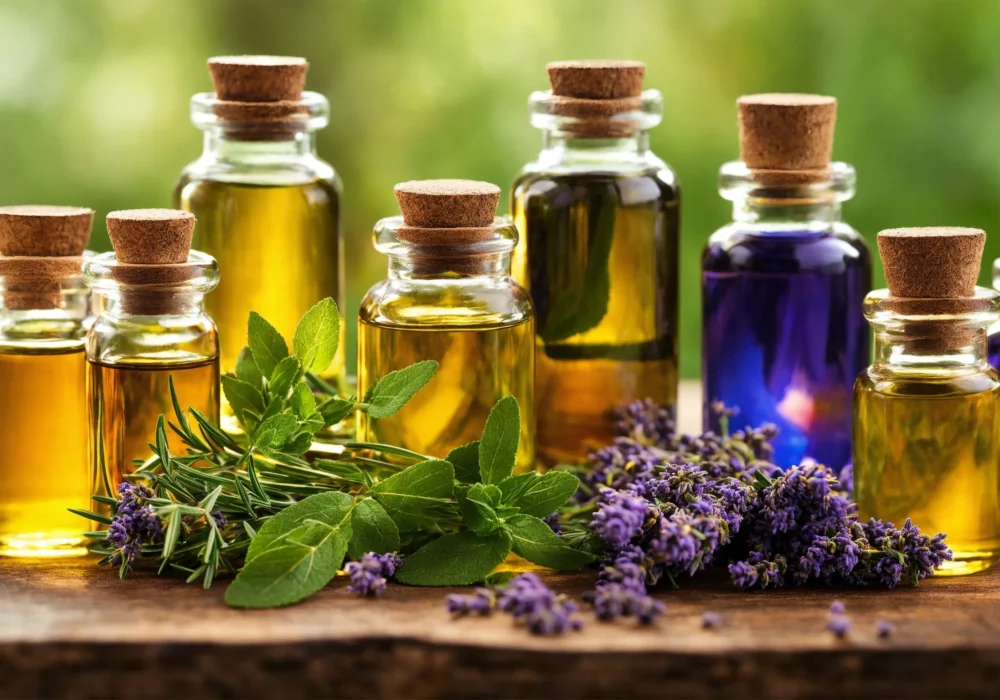What are essential oils, and how are they used?

Essential oils are concentrated plant extracts that capture the natural aroma and flavor compounds of the plant from which they are derived. These oils are extracted from various parts of plants, including flowers, leaves, stems, bark, and roots. Essential oils are known for their distinct and often pleasant scents, and they are used for various purposes, including aromatherapy, massage, skincare, and even as natural cleaning agents.
Here are some key points about essential oils and their uses:
- Extraction Process:
- Essential oils are extracted through methods such as steam distillation, cold pressing, or solvent extraction. The method used depends on the type of plant and the specific part of the plant from which the oil is derived.
- Concentration:
- Essential oils are highly concentrated, and a small amount can have a potent aroma. They are typically used in diluted forms, either in carrier oils, lotions, or diffusers.
- Aromatherapy:
- Aromatherapy is one of the most common uses of essential oils. Inhaling the aroma of essential oils is believed to have various therapeutic effects on mood and well-being. Essential oil diffusers disperse the oils into the air for inhalation.
- Massage and Topical Use:
- Essential oils can be diluted in carrier oils, such as jojoba or coconut oil, and used for massage or applied topically. Some oils are believed to have soothing or rejuvenating effects on the skin.
- Skincare:
- Some essential oils are incorporated into skincare products for their potential benefits. For example, tea tree oil is known for its antimicrobial properties, while lavender oil is often used for its calming effects.
- Household Cleaning:
- Essential oils with antimicrobial properties, such as tea tree, eucalyptus, and lemon, can be added to natural cleaning solutions. They may help with both cleaning and providing a pleasant scent.
- Flavoring:
- Certain essential oils, such as peppermint, lemon, and orange, are used as natural flavorings in food and beverages. It’s crucial to use food-grade essential oils when intended for consumption.
- Bath and Body Products:
- Essential oils are often added to bath salts, shower gels, and bath oils for their aromatic properties. Some people find that certain oils can promote relaxation during bathing.
- Candles and Wax Melts:
- Essential oils can be added to candles or wax melts to provide a natural and aromatic alternative to synthetic fragrances.
- Medicinal Use:
- In some traditional and alternative medicine practices, certain essential oils are believed to have medicinal properties. For example, eucalyptus oil is used for respiratory issues, and peppermint oil is used for digestive discomfort.
- Caution and Safety:
- It’s essential to use essential oils with caution and be aware of potential sensitivities or allergies. Some oils may be irritating to the skin if not properly diluted. Pregnant individuals and those with certain health conditions should consult with a healthcare professional before using essential oils.
When using essential oils, it’s crucial to follow recommended guidelines for dilution and application, and to purchase high-quality oils from reputable sources. The therapeutic effects of essential oils can be subjective, and individual responses may vary. If you have specific health concerns or conditions, it’s advisable to seek advice from a healthcare professional before incorporating essential oils into your routine.
What are essential oils, and how are they used?
Blog: Tees Herbs Blog
Sponsors: Mixtapepsds, Conspiracyortruth
